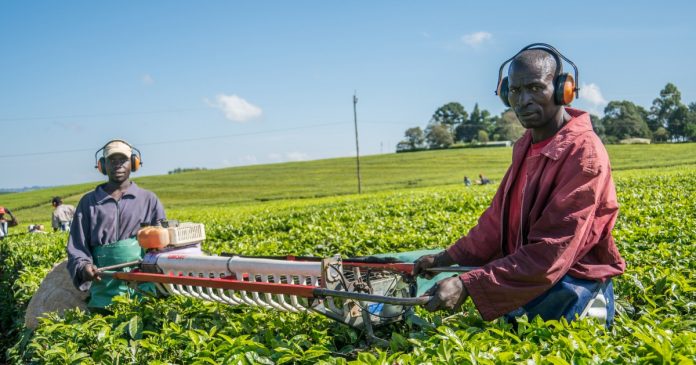How to modernize African agriculture when it is mainly done by very small farms? Several specialists in this question indicate the avenues retained, successful experiences or those to be improved.
Several decision-makers from the agricultural world have responded to the invitation of I-Conferences to discuss so-called “small-scale” agriculture. How to speak of agribusiness, agro-industry, in a continent where farms are very small and where subsistence agriculture still dominates in certain regions?
Marie-Claire Kalihangabo is the coordinator of the ADB mechanism for soil fertilization. It immediately frames the debate on “small-scale” agriculture. She considers that Africa has the potential to become self-sufficient and to become an agricultural player in international markets.
The continent has land, people, etc. Yet food insecurity still affects too many Africans. One of the main reasons is that farmers have insufficient links with markets, both on the input and supply side. The continent has 33 million farms of less than 2 hectares; they represent 80% of farms. And their contributions to the economy remain marginal.
Gaoussou Touré is Minister of Agriculture Promotion in Côte d’Ivoire. He explains his strategy in this area: put the producer at the center. He assumes that everything starts and ends with him in agriculture.
The minister rejects the term “small farmer”. Economic policy favors the development of the private sector, the agricultural enterprise. “Our policy aims to integrate into the value chain, that is to say that we start from education, land development, actual exploitation …”
Supervision, advice and input are essential elements so that the farmer does not lack for anything. In Africa, producers work on small, small plots, on average 0.5 hectares in rice.
No one can be profitable with such small plots; you need at least five hectares. Yet rice cultivation is essential in West Africa. This is why the Ivory Coast has the ambition to increase the size of farms.
This strategy involves, in particular, the meeting in cooperatives. Which could represent up to 250 hectares. “By pooling resources, no one feels wronged.”
Bring added value!
This task is fraught with pitfalls. For example, countries have in the past tried to facilitate mechanization by distributing equipment to cooperatives.
This experiment was not crowned with success, because the basic investments were not made, because nobody knows how to repair the tools, one cannot count on the resourcefulness!
Especially since it was necessary to monitor abuses, for example in the misuse of inputs. Supporting farmers also means supporting the maintenance of the production tool.
Lahcenn Ennahli is vice president for West Africa of OCP, the Moroccan producer of phosphates. He considers that the issue of small-scale agriculture in Africa is not insurmountable, but that it is complex. “Responding to them requires political will and heavy investment.”
Agriculture involves many sectors (research, infrastructure, education, health, finance, etc.) which requires a general involvement of those who are engaged in the value chain. Everyone brings their own stone.
A group like OCP has gone from simply being a producer of phosphate rock to a supplier of fertilizer and even now a processor of this fertilizer according to the specific needs of farmers.
Thus, manufacturers like OCP “bring more added value to the industry”. This rise in quality is the strategy to be followed in Africa, despite the challenge of involving everyone.
“States must rely more on the private sector to improve value chains. We know the know-how, the needs, how to supervise the farmers, etc.”
For example, access to inputs is a big challenge for farmers, but this issue is not insoluble. We see it in Nigeria, which has just decided on access to finance for farmers with zero-interest loans! When you know the interest rates charged (20% to 25%, sometimes more), this is a great incentive.
Pool resources!
Of course, it is obvious that upgraded and modernized infrastructure would improve the market; transformation must be encouraged, by dedicated infrastructures which would provide outlets for farmers.
Finally, in terms of land, Lahcenn Ennahli joins Minister Gaoussou Touré: the reforms to be undertaken must allow the aggregation of farmers, in order to generate economies of scale. Bringing farmers together makes it possible to pool tractors, for example. For 50 farmers, or 50 hectares, a tractor is enough.
The development of resources – Africa is not lacking – and the synergy of all the actors concerned can increase production by 30%, in the first step, according to the calculations of the vice-president of OCP.
Who takes the example of Senegal as proof, where the involvement of all stakeholders has greatly improved the milk sector. Finally, agriculture must take better advantage of technological innovations.
Innovative start-ups are developing interesting applications for small farmers, they must be encouraged.
Andrew Kwasari is an advisor at the Ministry of Agriculture in Nigeria. He considers that summing up the situation by the simple figure of 80% of “small farms” reduces the analysis. Governments can do more for peasants; for this, they need to collect more data.
Each decision-maker must know precisely the extent of the difficulties, the areas, the needs and the capacities, etc. in order to make the best decisions. The minister considers that the business environment is not favorable enough for the African farmer.
Policies must start from this evidence! Conversely, he continues, governments must not interfere in matters of market policy (inputs, sale of products, etc.). “States have a role of facilitator, through a clear and concrete policy based on known data”, he summarizes.
Technologically, small farmers are certainly dispersed, but they can be organized. Agribusiness is becoming hi-tech, which makes the issue of data even more essential.
The technology makes it possible to aggregate information and bring this essential information to farmers (price of inputs, products, for example). “The African population is young and fond of technology, we must take advantage of this asset to also attract them to more modern agriculture.”
Exit subsistence farming!
Asked about the importance of imports, including essential products, the Ivorian minister, Gaoussou Touré, admits that more than 6 million tonnes of rice per year are imported per year in West Africa. “In itself, this does not change the logic of the reasoning: agriculture is a business, a market. “
Well supported, African agriculture has the means to compete. In the next ten years, “considerable progress will be made in Africa, while other regions of the world will face more difficulties, due to land constraints.”
Certainly, but how can agriculture be developed further if it is still a subsistence industry?
Andrew Kwasari recognizes that a prerequisite for development is the strict verification that in each case the farmer can move up towards business agriculture. For this, it must improve its productivity. Thus, his income will increase and he will be able to expand his activity towards profitable, market-based agriculture.
Regarding the issue of productivity gains, Lahcen Ennahli points to the challenge and the difficulty of mechanizing activity in Africa. Beyond the too small size of the farms and the lack of organization, there is the question of access to finance.
The nature of the risk inherent in agriculture does not help in finding the right loans. But nothing is impossible: in Ghana, 4,000 women have benefited from access to mechanization, thanks to the use of a start-up.
This does not perform miracles, it only brings these women into contact with the large farmers or cooperatives who have tractors! Some owners of tools also find work, thanks to this linking of needs and resources. “This is a very useful and inexpensive initiative!”
Minister Gaoussou Touré welcomes this initiative. However, he would like to point out, by way of conclusion, that the development of agriculture is above all a question of methods. “Food security will no longer be a concern in Africa with good organization. The money will come by itself, if we have the right vision and the right perspective.”































